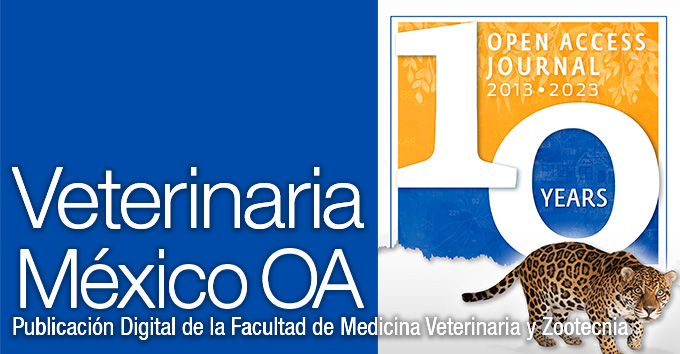Genome-wide association study for heat stress resistance in Brown Swiss cattle in Yucatan, Mexico
Main Article Content
Abstract
Global climate change has made heat stress tolerance an important trait to be considered in breeding programs to improve the resistance of productive animals to unfavorable environmental conditions. The aim of this study was to know the association between single nucleotide polymorphism (SNP) markers and heat stress resistance through a genome-wide association study (GWAS). Where 95 Brown Swiss dairy cows have measured body temperatures, respiratory frequencies, and genotypes. Seven SNP were detected with a statistically significant effect (P < 0.01) on respiratory frequency under heat stress. The markers with the highest association are in the Bos taurus autosome 6 (BTA 6), e.g. the BovineHD0600010397 SNP located within the FAM13A gene, and the BovineHD0600012612 SNP located within the PI4K2B gene. The ARS-BFGL-NGS-102407 SNP that is located in BTA 4 is the SNP that presents the highest number of associations to genes. Most of the genes are involved in cellular processes that are present in the resistance of individuals to high and humid environmental temperatures. These results provide new insights into the genetics of heat stress tolerance in Brown Swiss cattle in Yucatan, Mexico.
Article Details
References
Gerber PJ, Steinfeld H, Henderson B, Mottet A, Opio C, Dijkman J, Falcucci A. Tempio G. Enfrentando el cambio climático a través de la ganadería – Una evaluación global de las emisiones y oportunidades de mitigación. Roma: Organización de las Naciones Unidas para la Alimentación y la Agricultura (FAO); 2013. https://www.fao.org/3/i3437s/i3437s.pdf
Matteri RL, Carroll JA, Dyer CJ. Hypothalamic–pituitary–adrenal (HPA) axis. En: Moberg GP, Mench JA, editors. The biology of animal stress: basic principles and implications for animal welfare. Oxford, England; 2000. p. 45-50. (CABI Books). doi: 10.1079/9780851993591.0000.
St-Pierre N.R., Cobanov B, Schnitkey G. Economic losses from heat stress by US livestock industries. Journal of Dairy Science. 2003;86(Suppl.):E52–E77. doi: 10.3168/jds.S0022-0302(03)74040-5.
Misztal I. Model to study genetic component of heat stress in dairy cattle using national data. Journal of Dairy Science. 1999;82(Suppl1):32.
Misztal I, Bohmanova J, Freitas M, Tsuruta S, Norman HD, Lawlor TJ. Issues in genetic evaluation of dairy cattle for heat tolerance. En: 8th World Congress on Genetics Applied to Livestock Production. Belo Horizonte, MG, Brasil: August 13–18,2006.
Silanikove N. Effects of heat stress on the 342 welfare of extensively managed domestic ruminants. Livestock Production Science. 2000;67:1-18. doi: 10.1016/S0301-6226(00)00162-7.
Johnson HD. Bioclimatology and adaptation of livestock. En: World Animal Science B-5. Amsterdam: Elsevier; 1987. pp. 2-26.
Armstrong DV. Heat Stress interaction with shade and cooling. Journal of Dairy Science. 1994;(77):2044-2050. doi: 10.3168/jds.S0022-0302(94)77149-6.
Cardoso CC, Peripolli V, Amador SA, Brandão EG, Esteves GIF, Sousa CMZ, França MFMS, Gonçalves FG, Barbosa FA, Montalvão TC, Martins CF. Fonseca Neto AM, McManus C. Physiological and thermographic response to heat stress in zebu cattle. Livestock Science. 2015,182:83–92. doi: 10.1016/j.livsci.2015.10.022.
Goddard ME, Hayes BJ. Genomic selection. Journal of Animal Breeding and Genetics. 2007;124(6):323–330. doi: 10.1111/j.1439-0388.2007.00702.x.
Zhang L, Liu J, Zhao F, Ren H, Xu L, Lu J, Zhang S, Zhang X, Wei C, Lu G, Zheng Y, Du L. Genome–wide association studies for growth and meat production traits in sheep. PloS One. 2013;8(6):e66569. doi: 10.1371/journal.pone.0066569.
Hernández-Cordero AI, Sánchez-Castro MA, Zamorano-Algandar R, Luna-Nevárez P, Rincón G, Medrano JF, et al. Genotypes within the prolactin and growth hormone insulin -like growth factor- I pathways associated with milk production in heat stressed Holstein cattle: Genotypes and milk yield in heat stressed Holstein cows. Genetics and Molecular Research. 2017;16(4)gmr16039821. doi: 10.4238/gmr16039821.
González ME, González VM, Montaño MF, Medina GE, Mahadevan P, Villa C, et al. Genome - wide association analysis of body conformation traits in Mexican Holstein cattle using a mix of sampled and imputed SNP genotypes. Genetics and Molecular Research. 2017;16(2):gmr16029597. doi: 10.4238/gmr16029597.
Sigdel A, Abdollahi - Arpanahi R, Aguilar I, Peñagaricano F. Whole genoma mapping reveals novel genes and pathways involved in milk production under heat stress in US Holstein cows. Frontiers in Genetics 2019;10:928. doi: 10.3389/fgene.2019.00928.
Dikmen S, Khan FA, Huson HJ, Sonstegard TS, Moss JI, Dahl GE, Hansen PJ. The SLICK hair locus derived from Senepol cattle confers thermotolerance to intensively managed lactating Holstein cows. Journal Dairy Science. 2014;97(9):5508–5520. doi: 10.3168/jds.2014-8087.
Correa-Calderón A, Avendaño-Reyes L, López-Baca MA, Macias-Cruz U. Estrés por calor en ganado lechero con énfasis en la producción de leche y los hábitos de consumo de alimento y agua: Revisión. Revista Mexicana de Ciencias Pecuarias. 2022;13(2):488–509. doi: 10.22319/rmcp.v13i2.5832.
Weather spark. The Weather Year Round Anywhere on Earth. Mérida, México:2022. https://weatherspark.com/
National Research Council. A guide to environmental research on animals. Washington, DC, US: National Academy of Sciences; 1971.
R Core Team. R: a language and environment for statistical computing. Vienna, Austria: R Foundation for Statistical Computing; 2019. https://www.r-project.org/
Cui Y, Liao YC, Lo SH. Epidermal growth factor modulates tyrosine phosphorylation of a novel tensin family member, tensin3. Molecular Cancer Research. 2004;2(4):225-32. PMID: 15140944.
Deparis Q, Duitama J, Foulquié-Moreno MR, Thevelein JM. Whole-genoma transformation promotes tRNA anticodon suppressor mutations under stress. mBio. 2021;12(2):e03649-20. doi: 10.1128/mBio.03649-20.
Porto-Neto LR, Reverter A, Prayaga KC, Chan EKF, Johnston DJ, et al. The genetic architecture of climatic adaptation of tropical cattle. PLoS One. 2014;9(11):e113284. doi: 10.1371/journal.pone.0113284.
Stelzer G, Rosen N, Plaschkes I, Zimmerman S, Twik M, Fishilevich S, Stein TI, Nudel R, Lieder I, Mazor Y, Kaplan S, Dahary D, Warshawsky D, Guan-Golan Y, Kohn A, Rappaport N, Safran M, Lancet D. The GeneCards Suite: from gene data mining to disease denome sequence analyses. Current Protocols in Bioinformatics. 2016. 54:1.30.1-1.30.33. doi: 10.1002/cpbi.5. http://www.genecards.org
Halli K, Vanvanhossou SF, Bohlouli M, König S, Yin T. Identification of candidate genes on the basis of SNP by time-lagged heat stress interactions for milk production traits in German Holstein cattle. PLoS One. 2021;16(10):e0258216. doi: 10.1371/journal.pone.0258216.
Cohen M, Reichenstein M, Everts-van der Wind A, Heon-Lee J, Shani M, Lewin HA, Weller JI, Ron M, Seroussi E. Cloning and characterization of FAM13A1 —a gene near a milk protein QTL on BTA6: evidence for population— wide linkage disequilibrium in Israeli Holsteins. Genomics. 2004;84(2):374–383. doi: 10.1016/j.ygeno.2004.03.005.
Fathzadeh M, Li J, Rao A, Cook N, Chennamsetty I, Seldin M, Zhou X, Sangwung P, Gloudemans M, Keller M, Attie A, Yang J, Wabitsch M, Carcamo-Orive I, Tada Y, Lusis A, Kyun Shin M, Molony C, McLaughlin T, Reaven G, Montgomery S, Reilly D, Quertermous T, Ingelsson E, Knowles J. FAM13A affects body fat distribution and adipocyte function. Nature Commuications. 2020;11:1465. doi: 10.1038/s41467-020-15291-z.
Zhou J, Yue S, Xue B, Wang Z, Wang L, Peng Q, Xue B. Enhanced supply of methionine regulates protein synthesis in bovine mammary epithelial cells under hyperthermia condition. Journal of Animal Science and Technology 2021;63(5):1126-1141. doi: 10.5187/jast.2021.e93.
Mudadu MA, Porto-Neto LR, Mokry FB, Tizioto P, Oliveira P, Tullio RR, Nassu R, Niciura S, Tholon P, Alencar M, Higa R, Rosa A, Feijó G, Ferraz A, Silva LOC, Medeiros SR, Lanna DP, Nascimento ML, Chaves AS, Souza ARDL, Packer IU, Torres Jr RAA, Siqueira F, Mourão GB, Coutinho LL, Reverter A, Regitano LCA. Genomic structure and marker–derived gene networks for growth and meat quality traits of Brazilian Nelore beef cattle. BMC Genomics. 2016;17:235. doi: 10.1186/s12864-016-2535-3.
Bolormaa S, Hayes B, van der Werf J, Pethick D, Goddard M, Daetwyler H. BMC Genomics. 2016;17:224. doi: 10.1186/s12864-016-2538-0.
Collier RJ, Collier JL, Rhoads R, Baumgard LH. Invited review: genes involved in the bovine heat stress response. Journal of Dairy Science 2008;91(2):445-454. doi: 10.3168/jds.2007-0540.
Srikanth K, Lee S, Chung K, Park J, Jang G, Park M, Kim N, Kim T, Chai H, Park W, Lim D. A gene-set enrichment and protein–protein interaction network–based GWAS with regulatory SNPs identifies candidate genes and pathways associated with carcass traits in Hanwoo Cattle. Genes. 2020;11(3):316. doi: 10.3390/genes11030316.
License

Veterinaria México OA by Facultad de Medicina Veterinaria y Zootecnia - Universidad Nacional Autónoma de México is licensed under a Creative Commons Attribution 4.0 International Licence.
Based on a work at http://www.revistas.unam.mx
- All articles in Veterinaria México OA re published under the Creative Commons Attribution 4.0 Unported (CC-BY 4.0). With this license, authors retain copyright but allow any user to share, copy, distribute, transmit, adapt and make commercial use of the work, without needing to provide additional permission as long as appropriate attribution is made to the original author or source.
- By using this license, all Veterinaria México OAarticles meet or exceed all funder and institutional requirements for being considered Open Access.
- Authors cannot use copyrighted material within their article unless that material has also been made available under a similarly liberal license.



